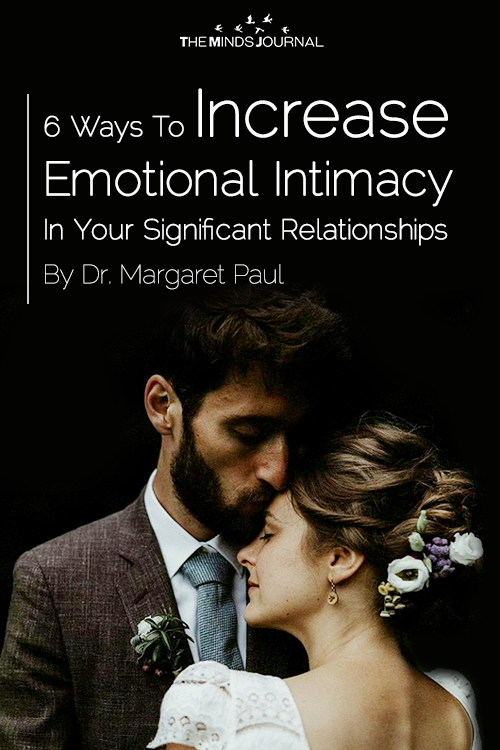Feeling emotionally connected with loved ones is a deeply fulfilling experience, but one that is all too often missing in our important relationships. Emotional intimacy thrives when both people, or all concerned, feel safe with each other.
The question then becomes — what creates safety?
Here are six ways to increase the emotional intimacy in your most significant relationships.
1. Take responsibility for your own feelings and needs.
When each person takes responsibility for their own feelings and needs, then no one fears getting blamed for the other person’s struggles. We feel safe when we know that we are not going to be attacked if we say something or do something that another person doesn’t like.
2. Be open to learning about yourself, both alone and with your partner.
We feel safe when we know we have an open arena in which to discuss any problems that might come up. If we’re afraid to bring up a problem because the other person might get angry, defensive, resistant, or withdrawn, emotional intimacy can’t survive.
3. Believe in your own and each other’s essential goodness.
We trust that our partner, family members, or close friends would never intentionally hurt us, so we know that if we feel hurt by them, it’s not deliberate. This makes it easy to ask about it and try to understand it within ourselves and with each other.
4. Be caring, kind, and compassionate with each other rather than judgmental.
One of the quickest ways of undermining intimacy is to be judgmental. When we fear another’s judgment, we feel tense rather than safe, open, or connected with that person.
Consciously and consistently choosing kindness and compassion with each other — as well as with ourselves — creates the environment of safety that allows intimacy to flourish. We need to be able to rely on each other’s caring in order to feel the safety necessary for emotional intimacy.
5. Be fully present with each other when you are together.
Presence is essential for emotional intimacy to flourish. Presence means that we are present in our bodies — in our hearts and souls — rather than just focused in our heads.
While we can connect with each other intellectually from our heads, we need to be present in our hearts and souls to connect emotionally. We connect emotionally through our feelings way more than through our thoughts. In order to connect through our feelings, we need to be present and willing to share them. While sharing feelings might feel vulnerable, vulnerability is essential for emotional connection.
6. Be devoted to honesty and integrity — to being trustworthy.
We need to be able to trust each other in order to be open and vulnerable. We trust that we are devoted to being honest with each other, even when it’s hard.
We need to know that integrity is important to each of us. Having integrity means not behaving in ways that go against our essence — our conscience. When we are true to our essential goodness, we become trustworthy.
It takes time to build the kind of trust that leads to emotional intimacy. We need to experience many different situations with each other to build the trust necessary for enduring emotional intimacy.
In a committed relationship, these are the ingredients necessary for both emotional and sexual intimacy. Emotional intimacy leads to sexual intimacy between partners, which is why there is frequently more passion at the beginning of a relationship than after many years.
Before partners build their walls against getting hurt, they are often open, kind, and present with each other — which facilitates passionate sexual intimacy. Many times, this is temporary, because the deeper trust isn’t yet there, and people often close down when their fears are activated.
But when people in long-term, committed relationships learn to take responsibility for their feelings, staying open to learning with each other; believe in their partner’s essential goodness; be present, kind, caring, compassionate, honest, and trustworthy with themselves and each other, both their emotional intimacy and their sexual intimacy will continue to deepen.
Written By Dr Margaret Paul
Love Yourself: A 30-Day at-Home Inner Bonding Experience with Dr. Margaret Paul – to learn to love yourself, rather than continue to reject and abandon yourself, which is the underlying cause of most anxiety, depression, guilt, shame, addictions and relationship problems – Starts February 21, 2018.
You may also like










Leave a Reply